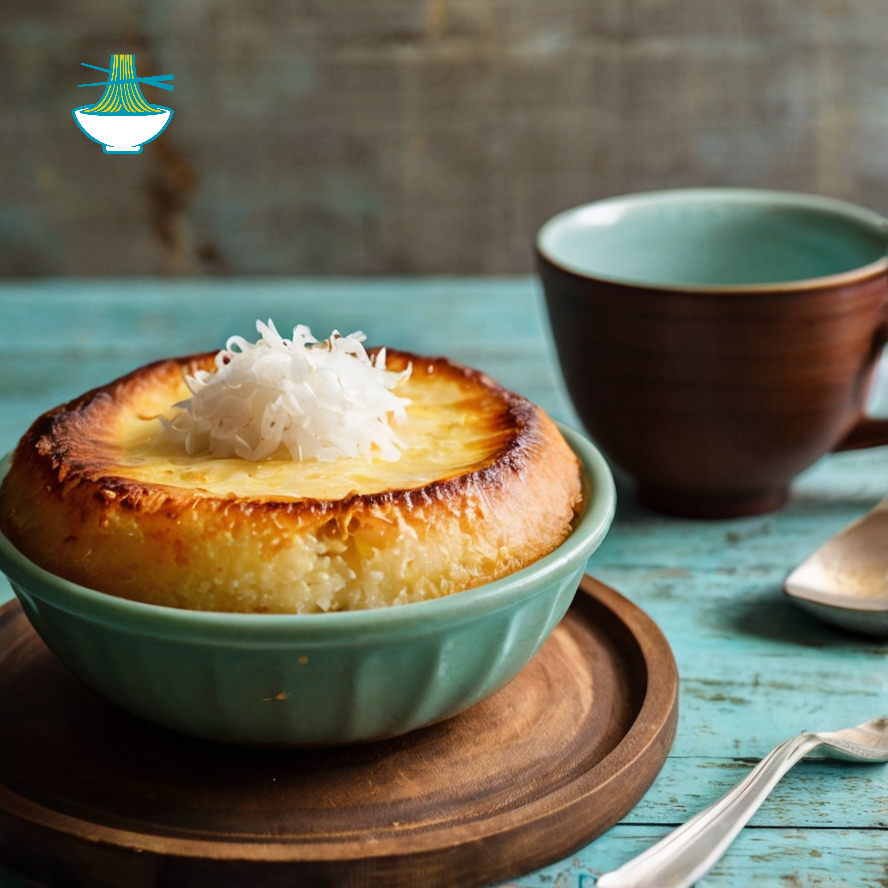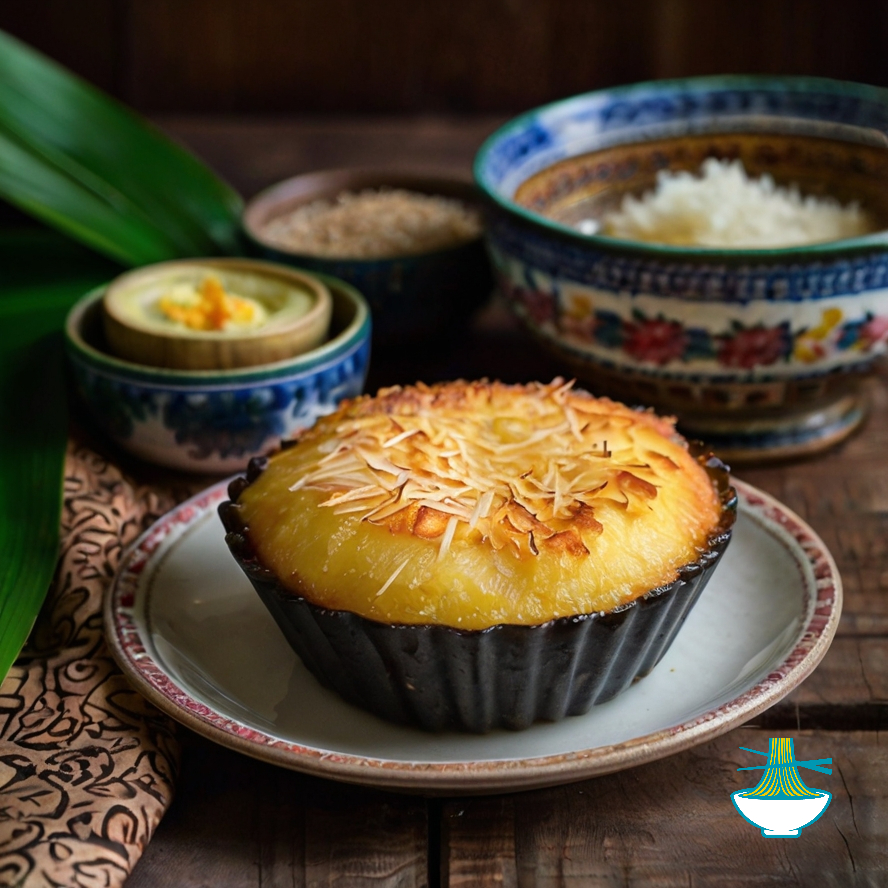Learn how to make Bibingka, a Filipino rice cake made with coconut milk, perfect for breakfast or dessert. This easy-to-follow recipe uses simple ingredients to create a sweet and savory treat that's sure to impress your friends and family.
Here's a recipe for Bibingka, a Filipino rice cake made with coconut milk:
Ingredients:
- 2 cups rice flour
- 1 1/2 cups coconut milk
- 1 cup sugar
- 3 eggs
- 1/2 cup butter, melted
- 1/2 teaspoon baking powder
- 1/4 teaspoon salt
- banana leaves, for lining the pan (optional)
Toppings (optional):
- salted duck eggs (itlog na maalat), sliced
- grated coconut
- grated cheese
- brown sugar
Instructions:
1- Preheat your oven to 350°F (175°C). If using banana leaves, cut them into pieces large enough to line the bottom and sides of a 9x13 inch baking pan. Lightly grease the banana leaves and baking pan with butter or cooking spray.
2- In a large bowl, combine the rice flour, sugar, baking powder, and salt. Mix well.
3- In another bowl, whisk together the coconut milk, eggs, and melted butter until well combined.
4- Pour the wet ingredients into the dry ingredients and mix until smooth.
5- Pour the batter into the prepared baking pan. If using toppings, sprinkle them over the top of the batter.
6- Bake in the preheated oven for about 25-30 minutes, or until the edges are golden brown and a toothpick inserted into the center comes out clean.
7- Allow the Bibingka to cool slightly before slicing and serving. Enjoy this delicious rice cake warm or at room temperature!
Nutritional Values:
Here are the approximate nutritional values for the ingredients in the Bibingka recipe:
Rice Flour (2 cups):
- Calories: 920
- Carbohydrates: 204g
- Protein: 12g
- Fat: 2g
- Fiber: 4g
benefits:
- Gluten-free: Suitable for those with gluten intolerance.
- Good source of energy: Provides carbohydrates for energy.
- May aid in digestion: Contains fiber that can support digestive health.
Coconut Milk (1 1/2 cups):
- Calories: 750
- Carbohydrates: 15g
- Protein: 7g
- Fat: 75g
- Fiber: 0g
benefits:
- Rich in healthy fats: Contains medium-chain triglycerides (MCTs) that can boost energy and may aid in weight loss.
- Source of iron: Important for the formation of red blood cells and transporting oxygen in the body.
- Contains vitamins and minerals: Including vitamin C, E, B vitamins, magnesium, potassium, and phosphorus.
Sugar (1 cup):
- Calories: 770
- Carbohydrates: 200g
- Protein: 0g
- Fat: 0g
- Fiber: 0g
benefits:
- Sugar acts as a natural preservative in jams, jellies, and other preserves. It helps prevent the growth of microorganisms, extending the shelf life of these products.
- Sugar provides glucose, an essential energy source for the brain and muscles. It's vital for maintaining cognitive functions and physical performance.
Eggs (3):
- Calories: 210
- Carbohydrates: 3g
- Protein: 18g
- Fat: 15g
- Fiber: 0g
benefits:
- High-quality protein: Important for muscle repair and growth.
- Rich in vitamins and minerals: Including vitamin B12, riboflavin, selenium, and choline.
- Good source of antioxidants: Such as lutein and zeaxanthin, which are beneficial for eye health.
Butter (1/2 cup):
- Calories: 813
- Carbohydrates: 0g
- Protein: 1g
- Fat: 92g
- Fiber: 0g
benefits:
- Source of healthy fats: Contains saturated fats and cholesterol, which are necessary for hormone production and cell membrane structure.
- Contains fat-soluble vitamins: Such as vitamins A, D, E, and K.
- Provides energy: High in calories, which can be beneficial for those needing to gain weight or maintain energy levels.
Baking Powder (1/2 teaspoon):
- Calories: 0
- Carbohydrates: 0g
- Protein: 0g
- Fat: 0g
- Fiber: 0g
benefits:
- Baking powder helps create a consistent texture in baked goods by evenly distributing air bubbles throughout the dough or batter. This prevents dense or uneven textures, resulting in a more uniform and tender crumb.
- Baking powder can be used in a wide range of recipes, from sweet desserts like cookies and cakes to savory items like scones, cornbread, and batters for fried foods.
Salt (1/4 teaspoon):
- Calories: 0
- Carbohydrates: 0g
- Protein: 0g
- Fat: 0g
- Fiber: 0g
benefits:
- Salt helps maintain the balance of fluids in the body by regulating the movement of water into and out of cells. This is crucial for preventing dehydration and maintaining overall hydration.
- Sodium, a major component of salt, is essential for transmitting nerve impulses. It helps in the proper functioning of the nervous system, including communication between the brain and muscles.
Total approximate values for the whole recipe:
- Calories: 3463
- Carbohydrates: 422g
- Protein: 38g
- Fat: 184g
- Fiber: 4g
Please note that these values are approximate and can vary based on the specific brands and quantities of ingredients used.


Comments